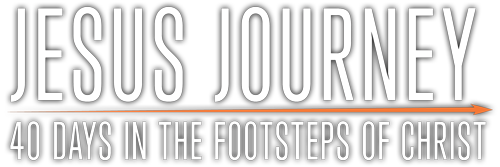Day 15
More Than Skin Deep
Read Matthew 5:1–12
I’m a little intimidated as I stand with the group from our church at the Mount of Beatitudes just outside Capernaum.
For some reason I cannot now fathom, back when I put together our schedule I had thought this would be a great spot for me to deliver a sermon.
Of course, now that I’m here, I can’t help but think of the first sermon preached at this spot. The most famous sermon in history. The Sermon on the Mount.
While we can’t be certain Jesus preached that sermon here, it seems likely, because: (1) this place forms a natural amphitheater with amazing acoustic properties, and (2) it’s on a big hill right outside Capernaum, very close to Bethsaida and Chorazin, the other two cities most often mentioned as places Jesus ministered.
In a rare bout of wisdom, I quickly realize that no words I can conjure could compare with Christ’s, so after a short prayer I encourage our group to open their Bibles, wander the gardens, and just read Jesus’ sermon.
I do give them this short orientation:
The lines that start the sermon are known as the beatitudes. That term comes from the Latin adjective beatus, which means happy, fortunate, blessed, or blissful. In Matthew 5 we have the Greek word for this eight times in a row, as sort of a poem.
Jesus says, here’s where true happiness is found.
When you’re poor in spirit — as opposed to the spiritual pride of the Pharisees.
When you’re meek — and not a preening religious show-off.
When you realize you’re starving for righteousness — and don’t think you can feed yourself.
When you’re pure in heart — as opposed to pure on the surface.
Someone said you could summarize the beatitudes with one line: Blessed are the desperate. To those who admit need and to those who hunger and thirst, Jesus says, a feast awaits.
WHAT’S IT ALL ABOUT?
These first few lines give a clue to what can be a perplexing mystery: What is this sermon about?
At times it seems so random. Jesus talks about prayer and giving and worry and judging and all kinds of varied topics. But is there one unifying theme?
Yes: God starts with the heart, not external religiosity.
Most of the other religious teachers of his day were emphasizing externals: Either Temple worship, or keeping the ritual religious rules, or both, as proofs of your devotion. Those teachers might have said, “Blessed are those who keep all their Temple duties” or “Blessed are those who do not work on the Sabbath.”
But Jesus doesn’t even mention those things in this sermon — except to say they fall far short as a measure of true spirituality.
Jesus emphasizes a person’s heart, and the actions of love that flow from the heart.
ON BEYOND RULE-KEEPING
After he introduces his sermon with the Beatitudes, he states the theme of his message:
“I tell you that unless your righteousness surpasses that of the Pharisees and the teachers of the law, you will certainly not enter the kingdom of heaven.” Matthew 5:20
The people’s hearts must have sunk when he said those words. The Pharisees were the most religious people on the planet. If religion was a basketball team, they’d be the Dream Team. If religion was a movie studio, they’d be Pixar. If religion was a restaurant, they’d be Emeril and Thomas Keller and Julia Child put together.
They were unbelievable religious performers. They added hundreds of rules to the Ten Commandments. Took it to a whole new level. When you washed your hands, the water had to drip off your elbow or it didn’t count. You couldn’t pick up a bucket on the Sabbath, or raise a certain weight of fork to your mouth, or gargle, because it was all considered work. No one could possibly keep all these rules. But the Pharisees took solemn vows to follow them as perfectly as possible.
So how could normal people hope to surpass that kind of achievement?
Jesus meant for the people to move beyond rule-keeping.
The Pharisees indeed performed well. But it had become all about the performance. They had complicated God’s command to live a holy life so much that it became less about loving God or people, and more about “Do you gargle on Saturdays?”
Jesus basically says, if that’s what you call righteousness, you need to move way beyond it!
RULES OR RELATIONSHIP?
For the rest of the sermon, Jesus elaborates on this theme.
And for the rest of his ministry, this becomes the issue between Jesus and the Pharisees. He will quote them this verse from Isaiah 29:13:
“These people honor me with their lips, but their hearts are far from me. They worship me in vain; their teachings are but rules taught by men.” Matthew 15:8–9
He will tell the people, “Everything they do is done for people to see….”
(Matthew 23:5a)
They were all about the performance. While Jesus was all about a heart change stemming from a life-changing relationship with God.
That doesn’t mean you can live as a rule-breaker. It means your motive for holiness has totally changed, to the point where you’re living a holy life almost before you realize it. Because you’re focused on the Holy God, not on your attempts at holiness. You’re centered in the Who, not the how. You “seek first the kingdom of God” and all the rest is added.
It reminds me of the dance lessons we were forced to take as part of our P. E. class in fifth grade. I felt awkward, clumsy, and focused entirely on the steps of the dance. Once I had them memorized, and the teacher said, “Begin!” I grabbed my poor partner Becky’s hand and tried to stomp around as precisely as I could — right, left, left, right! — while avoiding all eye contact with her — until the end of the dance, when my sweaty hands slipped from hers and I immediately went back to sit with the other embarrassed boys.
Compare that to the time I entered a dance contest with my first girlfriend a few years later. It was the height of the disco era, and you could not stop us! We not only memorized steps, we made up new dances — and we won! The funny thing is, I was focused not on the steps, but on how much fun I was having with this wonderful girl.
Both of those events were called “dances.” When I was a fifth grader, my steps may have even been more technically perfect. But unless my dancing surpassed that of the fifth graders at Athenour School in San Jose, I was never going to understand the joy of the dance. In fifth grade I knew the steps — but I completely missed the point.
Jesus is saying, essentially, just take my hand and follow my lead and you will learn the steps. This is not a dance class. It’s a love relationship.
That kind of surrender only happens when you admit the dance class approach isn’t doing it for you. When you admit you’re weak, hungry, thirsty, needy. That’s why it’s those who realize the depth of their need who are truly blessed.
Next, Jesus has a very modern metaphor for those whose religion is only skin-deep.
But for now, why not join us here on the Mount of Beatitudes? Read the opening lines of the greatest sermon ever preached. And imagine Jesus saying them to you.
Ponder
How has the joy of your “dance” with Jesus been reduced to technical steps recently? How could what you’ve learned about Jesus so far help you restore joy to your “dance”?

 Buy Jesus Journey at Amazon.com
Buy Jesus Journey at Amazon.com